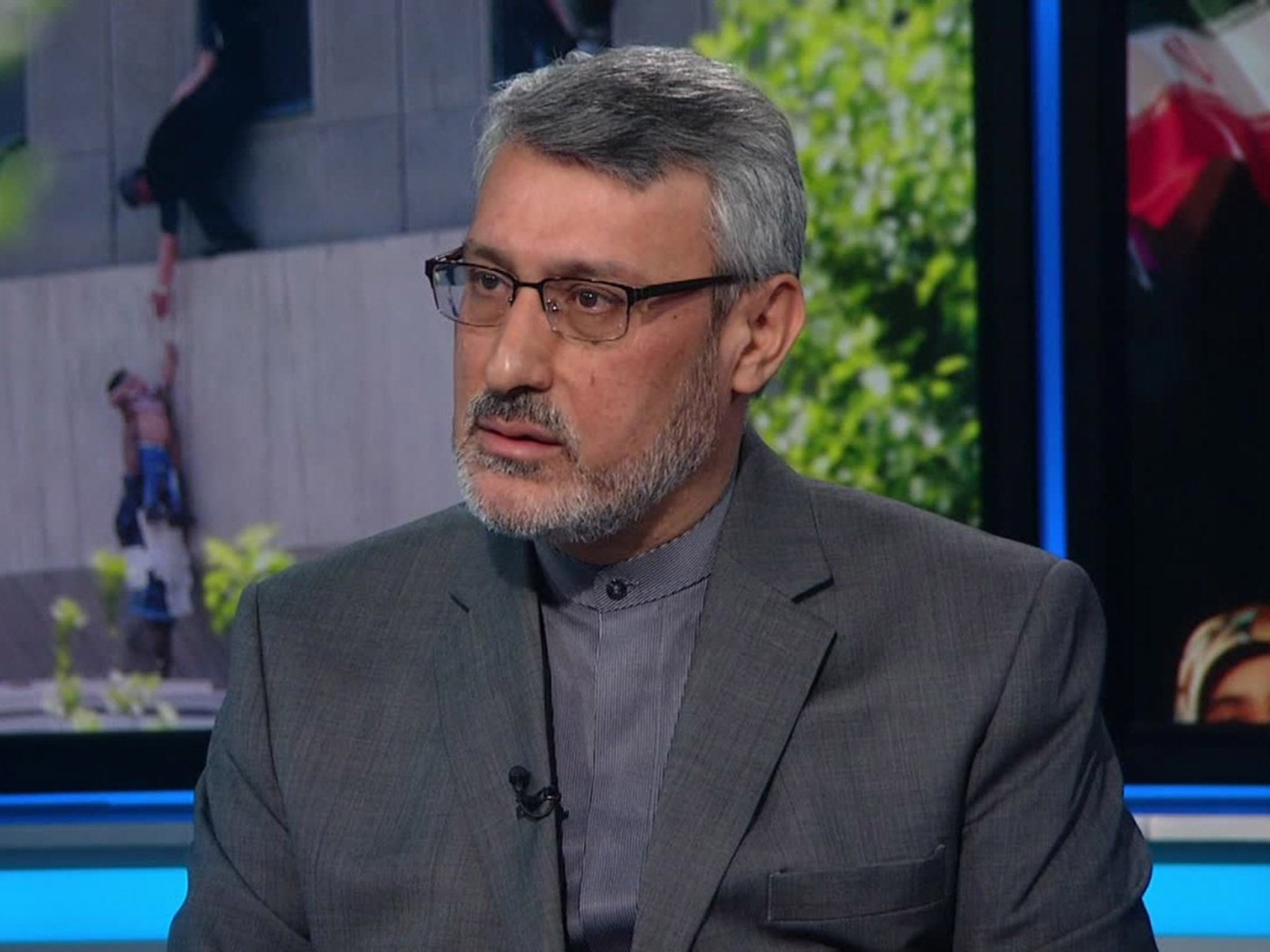Iran will challenge nuclear deal ‘every two months’ unless Europe takes action, ambassador warns
Tehran's commitment to the Non-Proliferation of Nuclear Weapons Treaty also at risk of being in ‘total jeopardy’ as it comes up for review next year

Your support helps us to tell the story
From reproductive rights to climate change to Big Tech, The Independent is on the ground when the story is developing. Whether it's investigating the financials of Elon Musk's pro-Trump PAC or producing our latest documentary, 'The A Word', which shines a light on the American women fighting for reproductive rights, we know how important it is to parse out the facts from the messaging.
At such a critical moment in US history, we need reporters on the ground. Your donation allows us to keep sending journalists to speak to both sides of the story.
The Independent is trusted by Americans across the entire political spectrum. And unlike many other quality news outlets, we choose not to lock Americans out of our reporting and analysis with paywalls. We believe quality journalism should be available to everyone, paid for by those who can afford it.
Your support makes all the difference.Iran‘s resuming of uranium enrichment will be followed by similar steps every two months unless European states do more to save the country’s nuclear deal with international powers, one of the Tehran’s senior diplomats has declared.
Hamid Baeidinejad, the ambassador to the UK, also warned that influential figures in Iran are advocating leaving the Nuclear Non-Proliferation Treaty in response to perceived failure by European signatories to fulfil obligations under the treaty and crippling sanctions imposed by the Trump administration.
The ambassador spoke amid rising tension with Tehran claiming that an International Atomic Energy Authority (IAEA) inspector stopped from entering a facility at Natanz was “tested positive for explosive nitrates” and US Secretary of State Mike Pompeo accusing Iran of positioning itself for a “rapid nuclear breakout.”
Tehran has accused Britain, France and Germany -- who have remained in the nuclear deal along with Russia and China after the US pulled out -- of failing to establish an adequate financial structure to enable companies to trade with Iran in face of American sanctions.
Iran, said Mr Baeidinejad, has been fulfilling its obligation under Joint Comprehensive Plan of Action (JCPOA) since Washington reneged on it and brought in punitive sanctions, and was now taking form steps as a “wake-up call” to the other signatories.
The decision to inject uranium gas into centrifuges in the underground Fordaw facility was the fourth move Iran has made as part of this policy.
“We cannot continue to fulfil one-sidedly so we have taken these decisions. If the other does not take the warning seriously, maybe through the use of Instex we shall be in a very difficult situation, all of us. But we hope with these steps we are conveying a strong, real and serious message to implement the nuclear deal” Mr Baeidinejad said.
Instex is the payment channel set up by JCPOA signatories UK, Germany and France to help continue trade with Iran and circumvent US sanctions.
“We gave ample time to our partners and then we adopted this policy. In two months we will absolutely take the fifth step after analysing the situation. Like the other steps it will be very calculated and measured. So the ball is in their court, we hope to resolve the situation.”
“These steps will be every two months, this has been decided at the highest level. I understand the concern that after more of these steps we run out of initiatives and have steps which are not easily reversible and this will affect the implementation of the JCPOA, that is why we are asking our partners to fulfil their obligations and resolve this issue and protect the JCPOA.”
Speaking of internal pressure within Iran to pull out of the Treaty of the Non-Proliferation of Nuclear Weapons (NPT), the ambassador said the treaty is at risk of being in “total jeopardy” as it comes up for review next year.
Israel, India and Pakistan are outside the NPT and North Korea is continuing on its path of acquiring a nuclear arsenal, he wanted to point out. “It is viewed in some circles, some personalities in Iran that we are not benefiting from membership of the NPT at the moment.
“That is not the policy of the government. President [Hassan] Rouhani and the government of Iran are trying their best to convince the people, all the people and important personalities that it would not be in the interest of Iran to withdraw from the NPT.”
Mr Baeidinejad acknowledged that the Supreme Leader, Ayatollah Ali Khameini, has issued a fatwa, or religious order, against the country having nuclear weapons. “But unfortunately after problems with the JCPOA more and more people are listening to arguments to leave the NPT. We have renounced nuclear weapons, but the US is pressuring us and putting impediments on the path of us getting peaceful nuclear technology. So they don’t see any positives.”
Iran does not see that anything can be gained by dialogue with the US as long as the Trump administration continues with its current policies, said the ambassador.
“There is no interest in talking to the US. They have a hostile policy towards Iran, there is no sincerity in what they say, they are seeking the collapse of Iranian economy, of Iranian society.
“At one stage they said they want to have the same policy towards us as they have towards towards North Korea. But there have been no fruits from that at all. The US policy is one of incoherence.”
Join our commenting forum
Join thought-provoking conversations, follow other Independent readers and see their replies
Comments